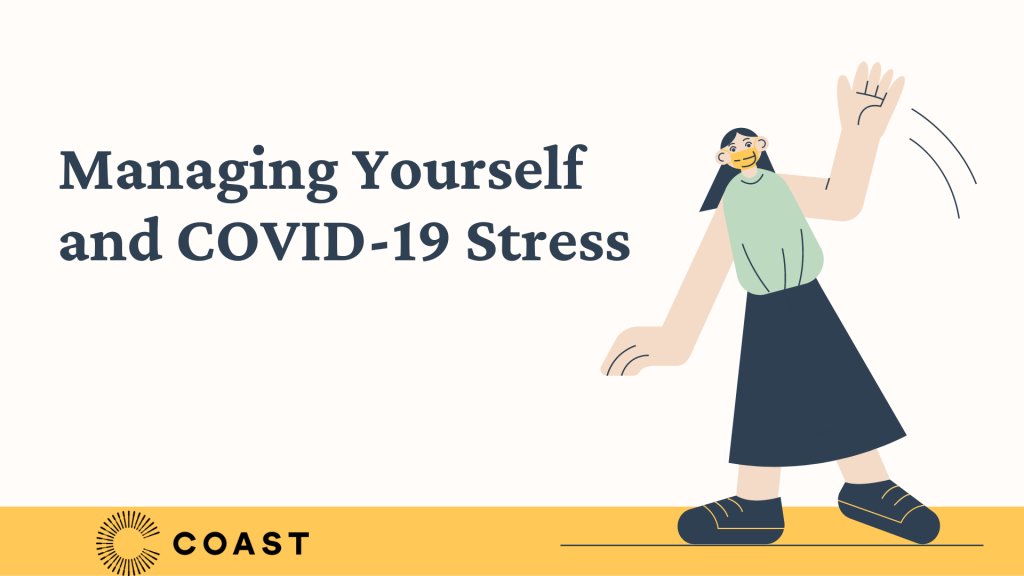
One of the main essences of COAST is to capitalise on simulator training to improve seafarer’s competence. Simulation is a concept that provides trainees with the taste of a real work environment. Our brains have this incredible ability to simulate or imagine situations, and according to some experts, the difference between reality and simulation is really thin in our minds. It is high time we used the knowledge of simulation as far as possible during the pandemic and utilize the tools and methods available in popular literature for our continued well-being and growth.
The challenges imposed by the pandemic has taken different dimensions over time. It is equally important (if not more) to emphasize the well being of our mental health as our physical health and there is no straight answer on how we should prepare ourselves in this unforeseen time.
Experts suggest different ways on how we should psychologically deal with the pandemic. Maybe we could put some of those suggestions mentioned below into our everyday practice to see if it really helps.
- Reframing Stress: Years of research point towards the direction where the amount or type of stress do not necessarily determine how bad the impact would be, rather how we perceive the situation does. Moreover, a positive mindset during high-stress situation fosters “stress-related growth” which psychologically toughens us in the long run. Research has also found that maintaining an adaptive approach to stressful situation fosters both physical (by reducing negative health symptoms) as well as psychological (by inducing positive emotions) gain.
- Minimizing the threat perception: Humans are rationally intimidated by any threat that exhibits fear. However, our reaction totally depends on how we perceive the threat. Research suggests that human exhibit the greatest behavioural change to overcome threat when they have confidence in self-efficacy. On the other hand, the perception of low-efficacy amidst an imminent threat would be counterproductive. Therefore, let’s keep ourselves away from the stream of negative news in the media regarding the pandemic and start believing in our resilience. It is not suggested to cut off from the news altogether but we should try to find a balance there.
- Managing “Optimism bias”: When someone believes that a negative event would less like to affect them, the phenomena can be referred to as Optimism bias. Refusing to wear masks and ignoring public health warnings are prime examples of such behaviour. We must ensure a balance in our own perception for breaking optimism bias without inducing pandemic anxiety at the same time.
- Managing emotions: Accurate estimation of health risk depends on factual information and rational thinking. On the other hand, our emotion interferes with our ability for rational thinking. Therefore, factual information has to pass through our emotional barrier to initiate action. Negative emotions can lead to perceiving negative information which in turn will lead to wrong actions. Negative framing capture human attention which the news media often practice. We need to maintain a positive state of mind to control emotions which will help us filter factual information from the wrong ones.
- Using “us” instead of “I”: It is a very popular perception that people get panicked and act in self-preservation during natural disaster instead of being considerate to everyone else. “Stockpiling” and “panic buying” during the COVID-19 pandemic can be referred to as an example. However, research has found that while some people exhibit selfish behaviour, most people show empathy during a natural disaster. Let us continue to show empathy for others in this difficult time.
- Reading and writing: The difference in the use of spare time makes us distinct from each other. Reading on diverse topics, and establishing a routine for daily writing (e.g., personal journal) has their own charm and hidden benefits to offset stress.
- “Social distancing” can be misleading: The term “social distancing” is being misused from the start to reduce the contagion of COVID-19. Alternatively, we should use “physical distancing” acknowledging the fact that social interaction is still possible even though we are physically distant from each other. Virtual interactions and distant contact with closed ones could help compensate for the lost social dimension of our life to a great extent.
- Mindfulness: A lot is said and written about the benefits of mindfulness or being staying in the moment. Some of us can resonate with it and others may find it amusing. “One size fits all” is not a solution, however, any technique which can help us or our minds to stop wander can be immensely beneficial in stressful times. It can be in any form for instance, yoga, meditation, breathing exercises, and so on. I would suggest exploring all avenues before settling on one method that suits an individual better than the others.
- Enjoying what we do: It is easy to start taking things for granted and surrounded with boredom especially during the pandemic restrictions. Finding ways to enjoy what we truly love could bring about changes in our daily life that could keep us occupied. Again, the discovery is very individual and each of us needs to find our own ways to explore our passion.
Last but not least, don’t say no to professional help. It is natural to feel overwhelmed at times due to anxiety on a social and personal level. We should seek professional help, when required, from doctors or therapists if those anxieties go beyond our control.